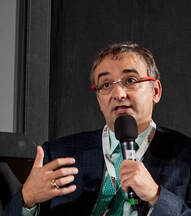Invited Speakers
Speaker: Nic Lane
Tuesday, September 15th, 2020 at 12:00PM – 01:00AM (Beijing), 12:00AM – 01:00PM (Washington), 06:00PM – 07:00PM (Rome)
Tuesday, September 15th, 2020 at 12:00PM – 01:00AM (Beijing), 12:00AM – 01:00PM (Washington), 06:00PM – 07:00PM (Rome)
Bio: Nic Lane (http://niclane.org) is a Senior Lecturer (Associate Professor) in the department of Computer Science and Technology at the University of Cambridge where he leads the Machine Learning Systems Lab (CaMLSys -- http://http://mlsys.cst.cam.ac.uk/). Alongside his academic role, he is also a Director (On-Device and Distributed Machine Learning) at the Samsung AI Center in Cambridge. Until May 2020, Nic was an Associate Professor in the Computer Science department at the University of Oxford. Earlier in his career, Nic held dual appointments at University College London (UCL) and Nokia Bell Labs. Of late, Nic research has specialized in the study of efficient machine learning under computational constraints, and over the last five years he has pioneered a range of embedded and mobile forms of deep learning. More generally, Nic’s research interests revolve around the modelling and systems challenges that arise when computers collect and reason over various types of complex real-world multi-modal sensor data. Nic has received multiple best paper awards, including ACM/IEEE IPSN 2017 and two from ACM UbiComp (2012 and 2015). In 2018 and 2019, he (and his co-authors) received the ACM SenSys Test-of-Time award and ACM SIGMOBILE Test-of-Time award for pioneering research, performed during his PhD thesis, that devised machine learning algorithms used today on devices like smartphones. Nic served as the PC-chair of ACM MobiSys 2019, a role he has performed also for ACM HotMobile and ACM SenSys in the past. Most recently, Nic is the 2020 ACM SIGMOBILE Rockstar award winner for his contributions to “the understanding of how resource-constrained mobile devices can robustly understand, reason and react to complex user behaviors and environments through new paradigms in learning algorithms and system design.” Prior to moving to England, Nic spent 4-years at Microsoft Research based in Beijing as a Lead Researcher. He received his PhD from Dartmouth College in 2011. Nic also received an M.Eng from Cornell University (2004) and a B.Sc (Hons) from the University of Waikato (2001).
Presentation: A Friendly Federated Learning Research Framework.... and a first look into the carbon footprint of federated methods
Abstract: Federated Learning (FL) has emerged as a promising technique for edge devices to collaboratively learn a shared prediction model, while keeping their training data on the device, thereby decoupling the ability to do machine learning from the need to store the potentially privacy sensitive user data in the cloud. However, despite rapid the progress made in FL in recent years, it still remains far too difficult to evaluate FL algorithms under a full range of realistic system constraints (viz. compute, memory, energy, wired/wireless networking) and scale (thousands of federated devices and larger). As a consequence, our understanding of how these factors influence FL performance and should shape the future evolution of FL algorithms remains in a very underdeveloped state.
In this talk, I will describe how we have begun to address this situation by developing Flower -- an open-source framework (http://flower.dev) built to help bridge this gap in evaluation and design. Through Flower, it becomes relatively simple to measure the impact of common real-world FL situations, such as if participating devices have limited compute resources (e.g., an embedded device), or when network speeds are highly varied and unstable. I will highlight early empirical observations, made using Flower, as to what the implications are for existing algorithms under the types of heterogeneous large-scale FL systems we anticipate will increasingly appear. Finally, to showcase the potential and flexibility of Flower, I will show how it can even be used to make assessments of the carbon footprint of FL in various settings -- to the best of our knowledge, this is the first time FL has been studied from the perspective of its environmental impact.
Presentation: A Friendly Federated Learning Research Framework.... and a first look into the carbon footprint of federated methods
Abstract: Federated Learning (FL) has emerged as a promising technique for edge devices to collaboratively learn a shared prediction model, while keeping their training data on the device, thereby decoupling the ability to do machine learning from the need to store the potentially privacy sensitive user data in the cloud. However, despite rapid the progress made in FL in recent years, it still remains far too difficult to evaluate FL algorithms under a full range of realistic system constraints (viz. compute, memory, energy, wired/wireless networking) and scale (thousands of federated devices and larger). As a consequence, our understanding of how these factors influence FL performance and should shape the future evolution of FL algorithms remains in a very underdeveloped state.
In this talk, I will describe how we have begun to address this situation by developing Flower -- an open-source framework (http://flower.dev) built to help bridge this gap in evaluation and design. Through Flower, it becomes relatively simple to measure the impact of common real-world FL situations, such as if participating devices have limited compute resources (e.g., an embedded device), or when network speeds are highly varied and unstable. I will highlight early empirical observations, made using Flower, as to what the implications are for existing algorithms under the types of heterogeneous large-scale FL systems we anticipate will increasingly appear. Finally, to showcase the potential and flexibility of Flower, I will show how it can even be used to make assessments of the carbon footprint of FL in various settings -- to the best of our knowledge, this is the first time FL has been studied from the perspective of its environmental impact.
Speaker: Frank Boissière
Wednesday, September 16th, 2020 at 12:00PM – 01:00AM (Beijing), 12:00AM – 01:00PM (Washington), 06:00PM – 07:00PM (Rome)
Wednesday, September 16th, 2020 at 12:00PM – 01:00AM (Beijing), 12:00AM – 01:00PM (Washington), 06:00PM – 07:00PM (Rome)

Bio: Policy Coordinator & Programme Officer, Internet of Things Unit, DG CONNECT, European Commission. Franck Boissière is in charge of IoT policy developments, with particular interest in interoperability, standardisation, cybersecurity, trust and privacy. During more than 25 years in the European Commission he has first been involved in a wide spectrum of research programmes (next generation internet, high performance computing, research infrastructures, cyber physical systems and control), and in many of the EU Digital Agenda and Digital Single Market policy such as standardisation, e-Commerce, digital payments and cybersecurity. Before joining the European Commission Franck Boissière was working research engineer at France Télécom in charge of multimedia equipment, protocols and services. He received his engineering degree from the French École Polytechnique in 1983 and specialised as telecom engineer in Telecom Paris.
Presentation: Smart Anything Everywhere: Lessons learnt from the European IoT Large Scale Pilots
Abstract: The presentation will present the main achievements from the past 5 years of the European research and innovation programme Horizon 2020, drawing lessons from the https://european-iot-pilots.eu/, highlighting to key role of Digital Innovation Hubs, hinting at future challenges and opportunities offered by the next European research program.
Presentation: Smart Anything Everywhere: Lessons learnt from the European IoT Large Scale Pilots
Abstract: The presentation will present the main achievements from the past 5 years of the European research and innovation programme Horizon 2020, drawing lessons from the https://european-iot-pilots.eu/, highlighting to key role of Digital Innovation Hubs, hinting at future challenges and opportunities offered by the next European research program.

